96 F. high in the Twin Cities Monday.
83 F. average high for July 23. It's fallen one degree since early July.
85 F. high on July 23, 2011.
23 days at or above 90 F. this year in the Twin Cities.
+7.4 F. July temperatures are running over 7 F. warmer than average in the metro, to date.
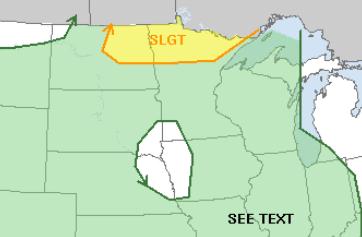 Slight severe storm risk
Slight severe storm risk today over central and southern Minnesota.
 Slight Relief
Slight Relief.
After reaching upper 80s to near 90 (with a few hours of sun) today
through Thursday temperatures cool off slightly Friday, before warming
again over the weekend. No more 100-degree days in sight, but we may
come close to 90 again Sunday, Tuesday and Wednesday of next week.
Graphic above: ECMWF model.
10" rain fell on the Twin Cities July 23, 1987
(9.15" of that fell in 5 hours). It was the largest rainfall event in
Twin Cities history. Details below.
Bejing: heaviest rain in 6 decades impacting an
estimated 2 million residents; the Chinese government is now under
intense criticism for not doing a better job of warning citizens about
the impending flood - details below from The Christian Science Monitor.
Photo:
Weather Underground.
3.7 x 10-00. "
June broke or tied 3,215
high-temperature records across the United States. That followed the
warmest May on record for the Northern Hemisphere – the 327th
consecutive month in which the temperature of the entire globe exceeded
the 20th-century average, the odds of which occurring by simple chance
were 3.7 x 10-99, a number considerably larger than the number of
stars in the universe." - from a Bill McKibbin article at
The Rolling Stone; details below. Photo: NASA.
"
A recent report
by the Natural Resources Defense Council estimated that by century’s
end, climate change will lead to more than 150,000 extra heat-related
deaths in the U.S., and a 2010 article in Environmental Health Perspectives that looked just at Chicago projected between 166 and 2,217 extra deaths every year during the last two decades of the century." - from a story below focused on excessive heat and increasing mortality among the elderly from Climate Central.
"
Writing in journal Nature,
22 researchers from the field of paleontology, ecology, geology, and
population biology equate mankind’s unkind impact on the planet to
global events millions of years ago that caused mass extinctions.
“Humans are now forcing another such transition, with the potential to
transform Earth rapidly and irreversibly into a state unknown in human
experience,” wrote the authors." - excerpt from an article at takepart.com; details below.
An Interview With Local Climate Scientist John Abraham. Details below the 7-Day.
Monday Record Highs:
106 F. Topeka, Kansas
109 F. Valentine, Nebraska
104 F. North Platte, Nebraska
105 F. Omaha, Nebraska
99 F. Mason City, Iowa
102 F. Indianapolis, Indiana
Shocking Satellite Images Of How Drought Is Impacting U.S. Crops.
Covestor.com has the story - here's an excerpt: "
These maps just released from the Ecology and Agriculture Spatial Analysis Laboratory at Kansas State University and Farm Futures
show the impact of this summer's severe heat wave and drought on U.S.
crops. They're based on satellite data taken over a two-week
period. Here's a comparison of this year's vegetation to the 23-year
average for this period (brown indicates 'decreased biomass' and green
indicates 'increased biomass)."
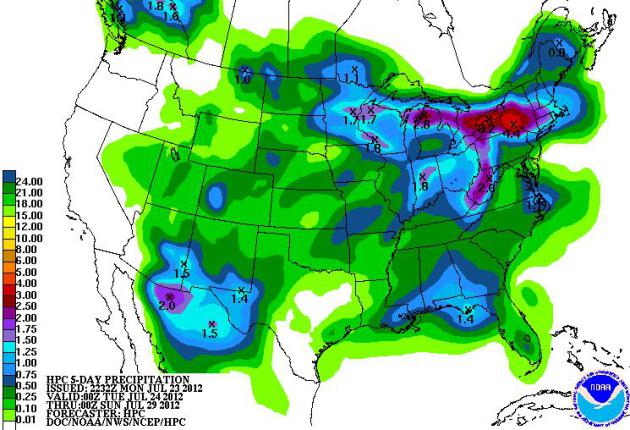 5-Day Rainfall Outlook
5-Day Rainfall Outlook. NOAA HPC's latest
rainfall outlook
shows the best chance of heavy showers and storms over the northern
tier states from Minnesota's Arrowhead and the U.P. of Michigan into
upstate New York. The drought continues to worsen over the Central
Plains.
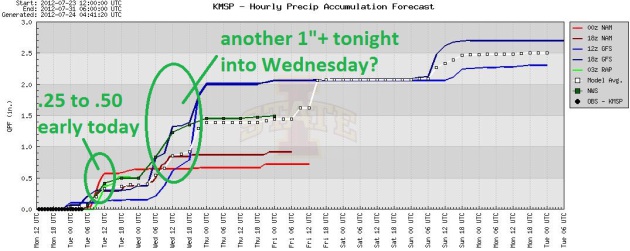 Welcome Rain
Welcome Rain.
Tricking these T-storms is an act of futility (best chance tends to
come nighttime hours into the early morning hours - another threat
around the dinner hour. Models are hinting at well over an inch of rain
for the MSP
metro from now through Wednesday; a relatively dry spell from Thursday into Saturday.
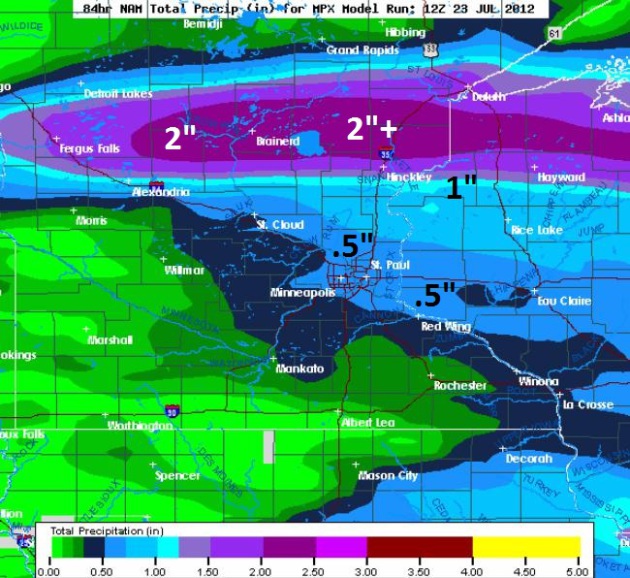 Best Chance Of Soaking Rains: Up North
Best Chance Of Soaking Rains: Up North. The latest NAM
model prints out some 2" amounts from near Brainerd to Duluth, closer to .50 to .75" for the immediate metro area.
Child Deaths In Hot Vehicles Rise To 14 After Incidents In Texas, West Virginia. A reminder not to even think of leaving a kid in a car seat, even for a few minutes. The
Jackson Examiner, Johnny Kelly, has more details on recent (preventable) tragedies: "
The
2012 death toll from children being left in hot vehicles has sadly
reached 14 after two separate incidents since Friday in Texas and West
Virginia. Authorities say a 3-year-old boy died after being left in
daycare center van in Dallas, Texas on Friday. According to NBC 5-TV, Dallas Fire-Rescue received the call from Little T's Tiny Tot Daycare, just before 5:15 p.m. CT."
"
Dallas police Lt. Scott Walton said the little boy was left in a
hot van outside the daycare after a field trip for possibly over two
hours. The child was given CPR as he was transported to Baylor Hospital
but doctors pronounced him dead at the hospital."
As Climate Change Worsens Elderly Face Deadly Heat. The story from
Climate Central; here's an excerpt: "
The
summer of 2012 isn’t even half over, and already the U.S. has been hit
with two crushing heat waves, and in both cases, the searing
temperatures have literally been lethal. Public health-workers know all
too well that whenever the mercury soars, people die — especially the
elderly, whose bodies are less resilient to stress than those of younger
folks. Climate change is only going to make things worse: as the
planet warms over the coming century, climatologists project that heat
waves will only get worse. That’s on top of a population that continues to age overall, expanding the number of likely victims."
Photo credit above: "flickr/
Matt McGee".
Beijing Floods Unleash Online Criticism Of Government. Here's an update on the recent (record) flash flooding in Beijing and the political consequences for China at
The Christian Science Monitor: "
For 16 hours on Saturday, sheets of unrelenting rain pummeled China’s capital, reportedly the heaviest storm in six decades. By Sunday, Pan Anjun, deputy chief of the Beijing
flood control headquarters, had tallied the damage. As the Chinese
newswire Xinhua reported: At least 37 people had died in storm-related
damage or events, including 25 who drowned, six who were trapped in
collapsing buildings, five who were electrocuted by fallen power lines,
and one who was struck by lightning. 500 flights into or out of Beijing Capital Airport
were canceled. 736 homes were flooded. 66,000 residents in the
hardest-hit areas had been temporarily located, many from the suburban
district of Fangshan. At least 31 roads or bridges had collapsed. All
told, Mr. Pan estimated 2 million people were affected..."
Photo credit above: "
A car damaged by floods is seen
after heavy rainfalls hit Zhou Kou Dian Village, Fangshan district,
near Beijing July 22. The Chinese capital's heaviest rainstorm in six
decades killed at least 37 people, flooded streets and stranded 80,000
people at the main airport, state media and the government said on
Sunday." REUTERS
1987 Twin Cities "Super Storm". On July 23, 1987
over 10" of rain soaked the southern suburbs - shutting down I-494 for a
couple hours with flash floods. Thousands were impacted by the severe
thunderstorms, a "train echo effect" that produced 3 months of rain in
one long evening. More details from
Wikipedia: "
The largest flash flood
in Twin Cities history occurred on July 23–July 24, 1987. Dubbed
locally The Super Storm, more rain fell from this event than any other
in recorded Twin Cities history. The storm caused damage to
9,000 homes, killed two people, and caused $27 million in damage. Some
areas in the southern metro area recorded 11 inches (279 mm) of rain. The 9.15 inches (232 mm) that fell on July 23 is the largest official single-day rainfall for the Twin Cities. Overall,
at least 10 inches (254 mm) of rain fell over 93 square miles (241 sq
miles), and at least 4 inches (100 mm) fell over 1,460 square miles
(3,781 square miles). This event was voted the eighth most significant
weather event in the state of Minnesota during the 20th century. Three days before this event on July 20–July 21, up to 9 inches (230 mm) of rain fell over some of these same areas. These
two storms combined to help the Twin Cities to their wettest summer on
record, with 23.52 inches (597 mm) of rain falling from June to August."
Here are a few videos of the event, courtesy of Tom Oszman at
TCMediaNow:
"Super Storm" Coverage
KARE-TV Sunrise (with Paul)
KARE-TV Evening Coverage (with Paul)
WCCO's Debbie Ely in standing flood water night of the storm
"Thought some of this might be enjoyable on the blog being (July 23) is the anniversary." - Tom Oszman.
Anatomy Of A "SuperStorm". The Minnesota Climatology Working Group has more on the 25th anniversary of the SuperStorm
here: "
Any
resident over the age of 30 who lived in the Twin Cities remember
where they were on July 23, 1987. The largest rainfall event in Twin
Cities' history began in the late evening and within six hours, ten
inches of rain fell at the Twin Cities International Airport, causing
massive flooding especially in the southern and western parts of the
metro."
Photo Of The Day: Shelf Cloud. Thanks to
Jason Weingart, from
lightningfastmedia.com, who snapped this amazing photo near Samsula, Florida yesterday.
Tricia's Gardening Tips. With the dry conditions in
place I asked Master Gardener Tricia Frostad for a few tips on what
people can be doing in their own gardens. Here is her advice:
"One way to reduce stress on your lawn is to
let your grass grow longer. Many of us have Kentucky Bluegrass, and it
should be kept to a height of at least 3". Taller grass will help shield
the soil and conserve moisture. It will also reduce weeks (which by
the way also take up moisture, so keep your gardens weeded as well).
It is always more efficient to water early in
the morning or in the evening. In the garden, drop irrigation or soaker
hoses generally do a much better job of watering at the base of plants,
where the water is needed. Deep watering allows the plants to develop
longer roots, which will help sustain them much better in dry weather
than more shallow roots, which can occur from frequent short waterings.
Typically plants require about 1" of water per week, however, in this
hot, dry weather, you will need to apply that inch more than weekly.
One clever trick I've learned is to take an empty milk container and
poke about 10 small holes in the lower side with a pin. Fill it with
water and set it next to your larger plants (like tomatoes). This method
works much like a soaker hose to ensure that roots get watered.
The most important factor for conserving water
in hot weather? Mulch! You want about a 3-4" layer of mulch around
plants to preserve moisture and prevent the ground for becoming hard and
dry.
Remember too that droopy leaves on a hot
afternoon are not always cause for alarm. In hot sunlight som plants can
close their stomata to reduce transpiration. It's like a natural
defense mechanism. Once the sun goes down and air temperatures cool, the
plants will resume their normal functions and the leaves will perk up."
Thanks Tricia. Some good and timely advice.
"Ask Paul". Weather-related Q&A:
"I had a small argument with some friends of
mine Saturday night that I would like you to clear up. A small storm
was in Marshal, MN, and coming toward us here in Mankato. They saw
lightning and said "that's heat lightning". I told them that's a
misnomer and siad it's from a storm in the distance. They had their
fancy iPhone and replied that there is such a thing. Well, I disagree.
What's your stance on this? Thanks in advance."
Greg Cooney
Greg - you won that bet. You're absolutely right. On a clear night
it's possible to see flashes of lightning hundreds of miles away,
reflecting off haze and high cirrus clouds. But thunder is rarely heard
more than 10 miles away. There is no such thing as "heat lightning". It
is simply the flash of distant lightning - too far away to hear the
thunder. Good work!
Hi Paul
"I have really enjoyed your blog and your Star
Tribune page. I think meteorology and the natural world are
fascinating. I’m sure you don’t want to hear this, but to me at least,
the constant daily discussion on climate change is depressing. Is it
real? Quite possibly it is. I don’t know. I’m not a climate scientist
and I do not spend my time reviewing the science. Call me an ostrich if
you want, but it upsets and depresses me to think about it. There is
so much unhappiness and bad news in the world. Maybe I am overly
sensitive, but it all really gets to me and brings me down. I don’t
know if man is responsible for the apparent climate change. Quite
probably he is, as mankind has done disastrous things to our planet. On
the other hand, we know from science and history that climate change
has occurred previously- even before humans were on the earth. So is
this all because of man, or is it a combination of things?
I’m not disagreeing with your beliefs. I’m
saying that your beliefs can be extremely depressing. What can I do
about stopping climate change? What can I do about a lot of ills in the
world? Like everyone, I have my beliefs and causes that I support with
time and money. I do my best to do what I can to live in a green way,
but I am tired of feeling guilty because I am not making stopping
climate change my top priority – not that I would be particularly
effective anyway. I respect your opinions and knowledge, I just don’t
want to read about the impending disaster Every Single Day. As I said,
it makes me feel hopeless and that it will happen anyway, no matter what
I do or don’t do. I have really enjoyed your blog, but I can’t take
the daily diet of gloom.
What about publicly designating a day or two a
week when you will not write about climate change and will focus on
other interesting topics? I try to skip over climate change in your
blog, but it’s hard not to see it and then start feeling beyond sad."
Thank you.
Kathleen Olona
Kathleen - I really struggle with this, more than you know. Every day
I wrestle with how much climate information to include in the daily
weather column, print and blog. The last thing I want to do is depress
you (or anyone else). There's enough depressing news out there. And yet I
also believe that the climate issue is - without question - the
biggest environmental threat facing the planet in the 21st century and
beyond. It's more than an environmental threat, it's an existential
threat. So to not say anything, to abstain from talking about climate
trends altogether, in the face of an increasing tsunami of evidence,
would be doing a disservice to readers.
How do you balance this? It's true - on the blog
you can more easily skip over the stories that you may find depressing
or distressing. In print, due to space limitations, I try to provide a
few headlines (when there is something new to report, some breaking news
that I believe is important or timely), and then point readers to the
blog for more details. I'm open to suggestions on how to better balance
climate news.
My priority is Minnesota weather, but weather and
climate have become hopeless intertwined. The background hum of a warmer
atmosphere is now the "Meteorological Muzak" that flavors all
weather, making heat waves hotter, droughts more severe, and rainfall
more intense. It's become increasingly impossible to separate them out
as time goes on. I'll keep trying to find the right balance (yes, there
will be days where I go a fairly long stretch without mentioning climate
trends or breaking stories). But this is a big deal. You should be
concerned, but better yet, channel that concern into constructive
outlets: contact your representatives in Congress and tell them of your
concerns. Assume nothing. Work toward shrinking your carbon footprint
and educating friends, colleagues and family members about climate
trends. Ignoring this won't make the problem go away, as good as that
sounds. Thanks for the note - and please know that I share your concerns
and will try to balance the bad news with solutions and suggestions
focused on things we can all do to lessen the long-term risk.
One thing I will try to do more of: present possible solutions,
steps we can all take to make a difference over time. The scope of this
challenge requires international cooperation, and smart regulation of
CO2 and other greenhouse gases. But consumers that gravitate toward
greener, more sustainable solutions, products and services will be
sending a powerful message to the markets. This is what has to happen,
and will unfold over time. Psychologists say that many people aren't
willing to accept a big problem until and unless there are viable
solutions. With climate change there is no silver bullet, but plenty of
(green) buckshot.
I'm including climate information so that you and
your family can take steps to better prepare for this new (warmer,
stormier) world we seem to be transitioning into (more details below).
Here are a few more thoughts from climate scientists (and journalists) I trust:
"
Once you realize that individuals can't solve the problem on their own, then the point of telling people what's to come isn't to get them to do a lot of stuff that is green. Indeed, part of the psychological opposition among some to the science is the feeling that people are only telling them the science to get them to do green stuff.
So what I generally do now is explain that they need
to understand this because is going to dramatically affect some of the
big choices they and especially their children are going to have to
make.
Should you own beachfront property? A lot of folks do or think about it.
Should you plan to retire to the Florida or the SW?
Where should you think about retiring to in 20 years?
Are they in a 1000-year flood zone?
What about some of their major long-term investments -- a farm, a ranch, a back-up generator, then you can get into solar panels.
What should their kids study in school to be employable in a globally warmed world?"
"
When I teach the climate change course I get the same reaction
so it is critical that people understand they have CHOICES that can
greatly impact the future in a POSITIVE sense. I use energy efficiency
to get the ball rolling because we can all immediately begin saving
money. Of course, that is just a small part of what we need to do but it
is a positive and immediate action we can take. Once folks realize that
the solutions are not gloom and doom two things happen:
1). They are willing to listen and to act on more difficult choices.
2). They get pissed at government inaction and make their voices heard.
See my post in the local online newspaper:"
"I think you should do a blog post that
features the three-part series "Earth: The Operator's Manual". I show
one after each exam in my cc course and these films have a huge positive
message. All can be viewed online at:"
- Scott Mandia, Professor of Physical Sciences, Asst. Chair. Suny Suffolk
The Ostrich Syndrome:
1). Ignoring it does not help.
2). Doing something about the problem helps in the long run, but.... (mitigation)
3). Meanwile we have to live with the consequences.
4). That means planning for the expected changes in sensible ways (vulnerability, adaptation, building resilience)...
5). and developing coping strategies for when those don't work (coping).
- Kevin Trenberth, head of the Climate Analysis Section at the USA National Center for Atmospheric Research (NCAR)
"
Don't stop. I got 45 years of the same thing on a different
subject. "Why do you always report the bad news?" My answer was always
the same: "Because it is the news. We tell you what's wrong, your job
is to fix it." You are telling people in a large audience, and
regularly that we've broken something. I'm sure you'll get lots of good
suggestions about how to approach the optimism piece of this. There
is, I'm assured, reason for optimism. But, don't be pushed off the
subject by people who feel depressed by the truth. They should feel
depressed by the truth."
- Don Shelby, former WCCO-TV anchorman and Emmy award-winning journalist
New Coating Technology Promises Self-Cleaning Cars. Will this eventually put car washes out of business? Stay tuned; in the mean time here are details from
gizmag.com: "
Nissan’s "Scratch Guard Coat” has been healing fine scratches on the company’s cars for a few years now, and the technology has also made its way into an iPhone case. More recent developments have produced coatings to heal more substantial scratches and scrapes using nano-capsules.
Now researchers at The Netherlands’ Eindhoven University of Technology
(TU/e) have developed a coating that is not only self-healing, but
also promises to free car owners of the tiresome chore of washing the
car."
Photo credit above: "
A new self-cleaning coating technology could mean the end of the tiresome chore of washing the car (Photo: Shutterstock)"
Five Men Agree To Stand Directly Under An Exploding Nuclear Bomb. Say what? Were these guys having a bad day or what? A truly head-shaking article from
NPR; here's an excerpt: "
They
weren't crazy. They weren't being punished. All but one volunteered to
do this (which makes it all the more astonishing). On July 19, 1957,
five Air Force officers and one photographer stood together on a patch
of ground about 65 miles northwest of Las Vegas. They'd marked the spot
"Ground Zero. Population 5" on a hand-lettered sign hammered into the
soft ground right next to them. As we watch, directly overhead, two
F-89 jets roar into view, and one of them shoots off a nuclear missile
carrying an atomic warhead. They wait. There is a countdown; 18,500 feet
above them, the missile is detonated and blows up..."
Photo credit above: "
Atom Central/YouTube."
Earliest Spiral Galaxy Ever Observed Puzzles Astronomers. Some interesting details from
gizmag.com: "
When
astronomers used the Hubble Space Telescope to scout a remote patch of
the sky and investigate the early stages of galaxy formation, they
stumbled upon something which they did not expect. They realized that
the distant spiral galaxy BX422, appearing to us as it was only three
billion years after the Big Bang, seems to be uncharacteristically
well-formed for its young age. By studying its features, which are in
direct contrast with our current knowledge of galaxy formation,
scientists hope to shed more light on how spiral galaxies – including
our own – are formed."
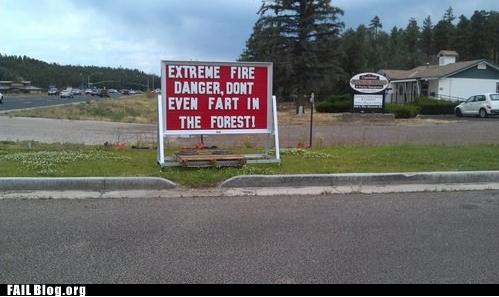
"
Most of life is hell; it's filled with failure and loss. People
disappoint you. Dreams don't work out - hearts get broken. And the best
moments of life, when everything comes together, are few and fleeting.
But you'll never get to the next great moment if you don't keep going.
So that's what I do. I keep going." - Political Animals, USA Network. Yep, that pretty much sums it all up.
Another Stinker. At least dew point temperatures
were in the low 60s in the metro, but I saw a steamy dew point of 76 at
Rochester by mid afternoon - tropical air just south of MSP. Monday
highs ranged from 81 at International Falls and Hibbing to 90 St. Cloud,
and 96 in the Twin Cities, after a sultry morning "low" of 77.
Paul's Conservation Minnesota Outlook for the Twin Cities and all of Minnesota:
TODAY: Unsettled and sticky with lot's of clouds; few T-storms likely. Dew point: 68. Winds: SE 8. High: 88
TUESDAY NIGHT: Showers and T-storms, locally heavy rain. Low: 73
WEDNESDAY: Mostly cloudy, humid and stormy. Heaviest rain and T-storms central and north. High: 85
THURSDAY: Slightly less humid. Late-day T-shower? Low: 71. High: 87
FRIDAY: Sunnier, drier statewide. Dew point: 62. Low: 65. High: 83
SATURDAY: Sunny, a bit warmer. Low: 66. High: 86
SUNDAY: Some sun, isolated T-storm possible. Low: 68. High: 88
MONDAY: Still muggy; more numerous storms. Low: 67. High: 86
Lake Effect
Like everyone else I have my evening routine:
shower, shorts, lake. In that order. If I don't get an hour or 2 of
quality sit-by-the-lake time, reading the papers, digging into a novel
on my trusty iPad, I feel like something is missing. I crave this
me-time; my wife thinks I'm anti-social.
It's been a good summer to sit by the lake or evacuate to the cabin: 23 days at/above 90 F.
Minnesota is on the northern edge of a sprawling
drought. No more "threat of rain" or "risk of a storm". Now it's an
Opportunity For Rain.
Sunday I drove from my boyhood home of
Lancaster, PA (Amish country) to the Twin Cities in 17 hours, chugging
along in a 16 foot rental truck loaded with furniture. Great fun. During
our 1,100 mile ordeal not a drop of rain. It summed up a torrid summer;
the sky just doesn't want to cook up showers.
Droughts can be self-perpetuating. Once moisture
is baked out of topsoil there's little water left to evaporate into
late-day instability T-storms.
A cooler front sparks random storms today and
Wednesday (heaviest rains over central Minnesota).
We may hit 90
again Thursday, but I suspect the worst of our Guam-like heat wave is
behind us now.
Cue the T-storms!
Climate Stories....
“All that is necessary for the triumph of evil is that good men do nothing.” (Edmund Burke)
Global Warming's Terrifying New Math. If you read only one article related to climate change - make it this one from Bill McKibbin at
The Rolling Stone; here's an excerpt: "
If
the pictures of those towering wildfires in Colorado haven't convinced
you, or the size of your AC bill this summer, here are some hard
numbers about climate change: June broke or tied 3,215 high-temperature
records across the United States. That followed the warmest May on
record for the Northern Hemisphere – the 327th consecutive month in
which the temperature of the entire globe exceeded the 20th-century
average, the odds of which occurring by simple chance were 3.7 x
10-99, a number considerably larger than the number of stars in the
universe."
Climate Emergency: A Five-Part Action Plan. Playing off McKibbin's article above, here's one suggestion for how we move forward - an excerpt from a
Huffington Post article: "
The
extreme heat, storms and drought sweeping most of the nation are
finally convincing a large majority of Americans that climate change is
upon us. According to Bloomberg News,
70 percent of Americans now believe the climate is changing. It's late
to be getting to solutions, but now, perhaps, we're finally ready to
take on the challenge. Bill McKibben lays out how dire the picture
really is in the upcoming issue of Rolling Stone: We've already warmed the planet by 0.8 degrees centigrade, and the weather is getting frightening. At the Copenhagen Climate Conference,
the one thing the world agreed on is that we must stay within a
2-degree centigrade heat increase -- although climatologist Jim Hansen
has called even that level of increase a recipe for disaster. And if
current trends continue, we're headed for much more global heating. But
powerful oil, gas and coal companies have blocked needed action. With
billions in profits, they have plenty of money to channel to political
campaigns, climate-denying think tanks, and right-wing media. Together,
these groups have prevented progress."
Climate Change: It's Real, And It's Dangerous. Here's an excerpt from the
National Catholic Reporter: "
Vast
raging forest fires, a gigantic wind and thunderstorm system, and
boiling, record-breaking temperatures have helped to further convince
millions of us -- including the majority of climatologists -- that the
earth's climate is dangerously changing, and human-induced global
warming is at the heart of it. A few weeks ago, a massive "land
hurricane" starting in the upper Midwest plowed a deadly, destructive
path south and east toward the mid-Atlantic. And with two long months
still to go, this summer has already produced huge, blazing wildfires
in Montana, Utah, New Mexico, Wyoming, and especially Colorado, where
Gov. John Hickenlooper declared, "This is the worst fire season in the
history of Colorado." A leading climate scientist, Jonathan Overpeck,
told The Associated Press that this summer's weather so far is "what
global warming looks like. ... The extra heat increases the odds of
worse heat waves, droughts, storms and wildfire." (For excellent
segments, go to: democracynow.org/special/extreme_weather.)"
Climate Science: The Gathering Storm.
The Guardian has an Op-Ed about recent climate trends; here's an excerpt: "
After the driest winter on record, Sir David Attenborough wouldn't be the only Briton to blame the wettest English summer ever on global climate change,
on some inexorable shift in the planetary machinery that upsets all
reasonable expectation. There is a connection, although no single
meteorological episode in any locality could ever be directly linked to
global warming: this flood or that cyclone might have happened anyway.
Even the increasing frequency worldwide of climate-related disasters,
along with the lives, homes and harvests lost, cannot be entirely blamed
on the steady increase in carbon dioxide levels in the atmosphere.
Population growth and economic development each year deliver more
potential victims, with more to lose. Finally, the measured increase in
the intensity of extreme events – ever fiercer heatwaves, ever more
violent floods – rests on an uncertain premise: if systematic weather
records in many parts of the world are barely a century old, what does
it mean to declare something "the worst ever" or a "once in a century"
flood?"
Loading The Climate Dice. Here's an excerpt of an Op-Ed from Paul Krugman at
The New York Times: "....
How
should we think about the relationship between climate change and
day-to-day experience? Almost a quarter of a century ago James Hansen,
the NASA scientist who did more than anyone to put climate change on the
agenda, suggested the analogy of loaded dice. Imagine, he and his
associates suggested, representing the probabilities of a hot, average
or cold summer by historical standards as a die with two faces painted
red, two white and two blue. By the early 21st century, they predicted,
it would be as if four of the faces were red, one white and one blue.
Hot summers would become much more frequent, but there would still be
cold summers now and then. And so it has proved. As documented in a new
paper by Dr. Hansen and others, cold summers by historical standards
still happen, but rarely, while hot summers have in fact become roughly
twice as prevalent. And 9 of the 10 hottest years on record have
occurred since 2000."
"FutureDude" Talks With Climatologist John Abraham. One of my favorite local techies and graphic artists, Jeff Morris, also known as "FutureDude" has an
in-depth conversation with local. St. Thomas climate scientist John Abraham; here's an excerpt: "
I
have to admit that I’m a little unnerved when it comes to our weather.
As a fan of meteorology, I’ve been paying attention since I was a kid.
I have noticed a trend toward wild weather patterns since the late
90’s. Since then, things in my area (the Upper Midwest) have gone to
extremes year after year: 500-year floods, then severe droughts; record
snowfalls, then the next season virtually no snow at all. We went from
an extremely dry winter and spring (I didn’t shovel snow all season,
and I live in Minnesota!) to record rainfalls in a matter of days. Now
we’re in a drought once again. It just doesn’t seem right. With tens of
thousands of high temperature records broken weekly across America and
over 60% of the country in a severe drought — I, like many, are
wondering if much worse things are looming over the horizon. It’s
beginning to feel like one of those dark apocalyptic movies. Except
this time, it’s real."

Winemaking Adapts In Face Of Changing Climate. Uh oh - when climate change starts to impact coffee and wine I'm paying attention now; details from Canada's CBC Network and
Yahoo News: "
Maybe
icewine will be produced in new areas across Canada. Maybe winemakers
will try their hand at drying grapes artificially off the vine. Or
perhaps vineyards will pop up in areas not known as wine regions. In
the face of changing climate conditions, Canadian grape growers, wine
producers and scientists are turning their attention to finding the
best ways to adapt. Climate change can be a controversial topic for
some folk, but not for those at the Cool Climate Oenology and
Viticulture Institute at Brock University, deep in the heart of
Ontario's Niagara wine region."
Photo credit above:
Janet Davison/CBC. "
Winter
temperatures are increasing in Niagara, where a microclimate on land
near Lake Ontario has helped a grape and wine industry flourish."
Top 10 Things Climate Change Is Making Worse Right Now. Here's an excerpt from a post at
truth-out.org: "...
Here are 10 impacts we're seeing right now that climate change is very likely worsening, in some cases playing a major role:
Rising Food Prices
Over half of the Continental U.S. is now facing severe
drought–the worst in fifty years. As a result of extreme temperatures
and little rain, corn production suffers although analysts predicted
record production at the start of the year. In coming months, record-high food prices will continue to rise, affecting thousands of supermarket products. See also "Story of the Year: Warming-Driven Drought and Extreme Weather Emerge as Key Threat to Global Food Security."
Goodbye Glaciers, Sea Ice
This week, an iceberg twice the size of Manhattan tore itself off of one of the largest glaciers in North Greenland, following another break of comparable size in 2010."
Science Says Earth On Brink Of Catastrophic Tipping Point.
Takepart.com has the story; here's an excerpt: "Citing the toxic confluence of rising temperatures,
rampant population growth,
and the clearing of more than 40 percent of the planet’s surface for
urban development or agriculture, a team of international scientists
says Earth could be nearing an ecological meltdown. Writing in journal
Nature,
22 researchers from the field of paleontology, ecology, geology, and
population biology equate mankind’s unkind impact on the planet to
global events millions of years ago that caused mass extinctions.
“Humans are now forcing another such transition, with the potential to
transform Earth rapidly and irreversibly into a state unknown in human
experience,”
wrote the authors.
Photo credit above: "
While cool to look at, this melting glacier and the waterfall it births certainly isn't cool for the planet." (Photo: Jan Tuve Johanson)
Who Is "Most To Blame" For Global Warming? Here's an excerpt of a post from
ABC News environmental reporter Bill Blakemore: "
Who’s
most to blame for global warming? Nobody meant it to happen. But it
has, and there’s no debate among the world’s scientists about which
country is “most responsible.” That is, about which nation has injected
the greatest amount of the heat-trapping invisible gas CO2 into to the
atmosphere, where a lot of it remains for years, piling up and only
adding to the heat. The answer: United States has, with China a distant
second. And figured on a per person basis, the “most responsible” is the
United Kingdom, with the United States a close second, Germany a close
third, and China a distant seventh."
How Global Warming Is Impacting Stock Prices. Here's an excerpt of an interesting article at
triplepundit.com: "
Heat waves and droughts magnified by global warming are exacting an economic tax on America’s middle class
through higher prices and increased health care costs. Now this global
warming tax is hitting the stock valuations of American companies.
Global warming’s economic tax hits restaurant stocks
The most visible evidence of how global warming could impact a
company’s stock price occurred on July 20 with sharp declines in
restaurant stock prices. Led by Chipotle’s stunning 20+% stock drop
all the major restaurant stocks including McDonalds took a hit as
stock analysts incorporated global warming’s heat and drought impacts
upon restaurant food costs, profit margins and sales if higher menu
prices trigger a consumer search for lower cost options."
Global Warming: In Geoengineering We May Trust. Groundreport.com has the story; here's an excerpt: "
At
least, there is reason to believe in a short-term source for respite,
geoengineering, if a feared level of climate change is about.
Geoengineering is now likely for large scale-deployment more than ever,
as weather anomalies globally have become a serious cause for concern
and news of rising levels of carbon emissions continue to come. Geoengineering
is the scientific answer to the tepidity of world leaders, towards a
global agreement to mitigate global warming-causing greenhouse
emissions. Geoengineering (or climate engineering) is a general name for
certain technologies aimed at reducing solar radiation available to
the earth, or at removing carbon dioxide (a major greenhouse gas) from
the atmosphere."


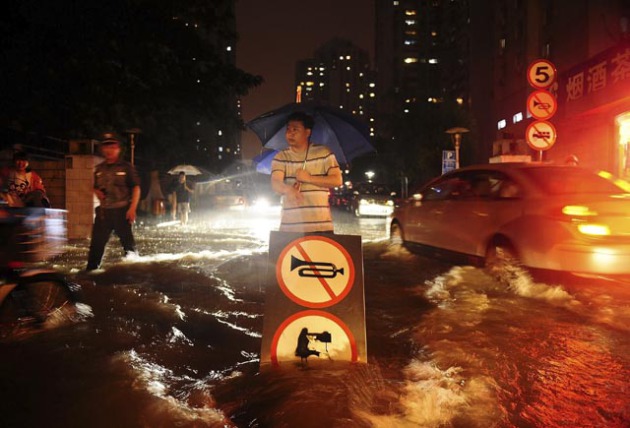
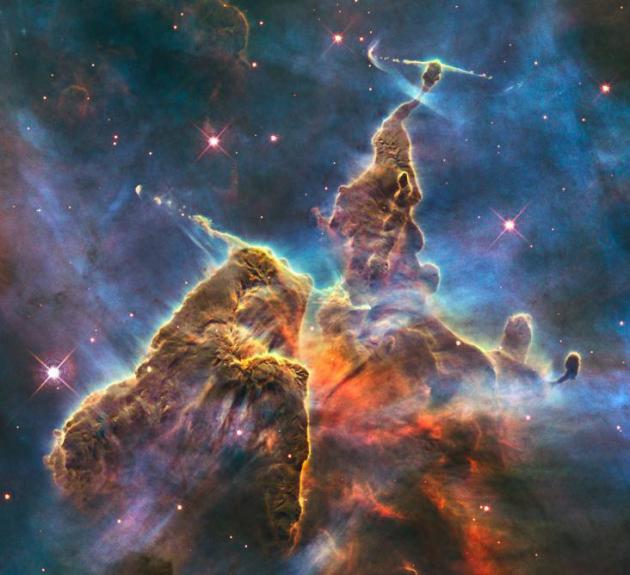
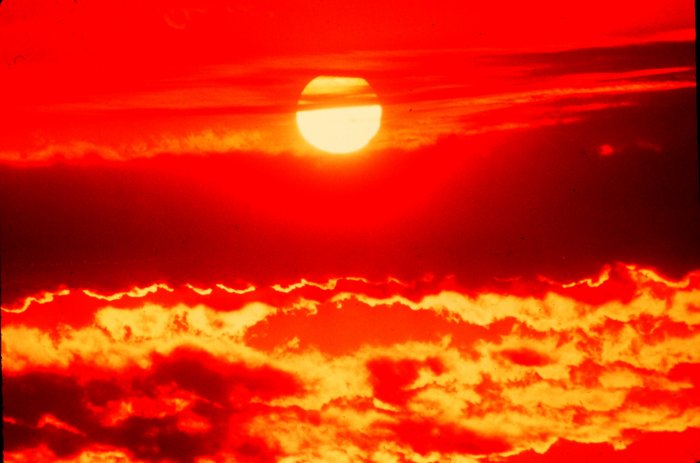
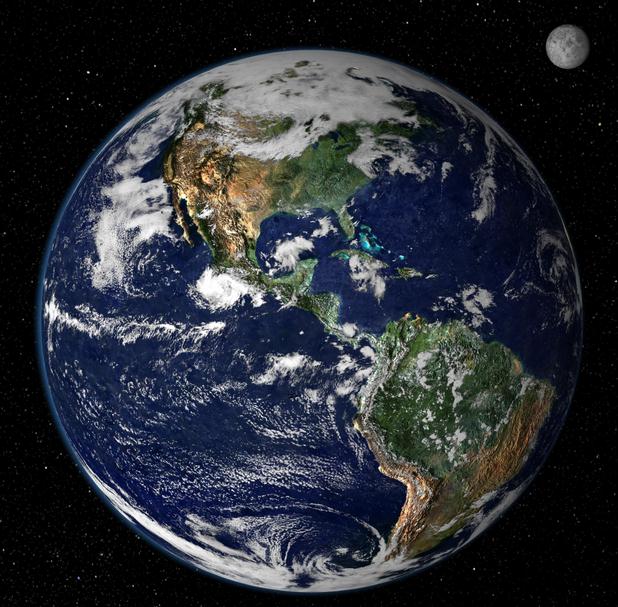

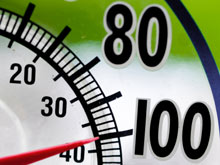
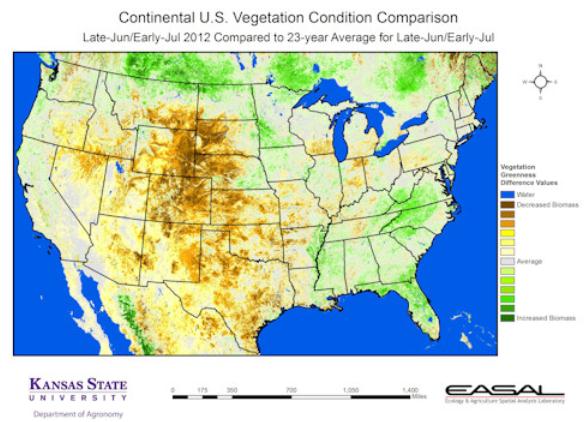




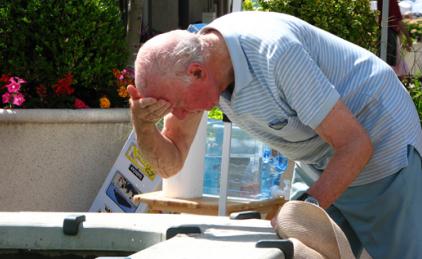
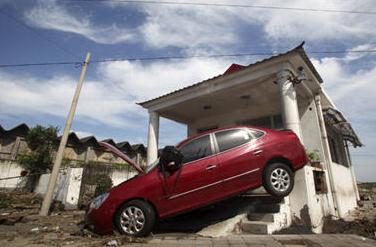
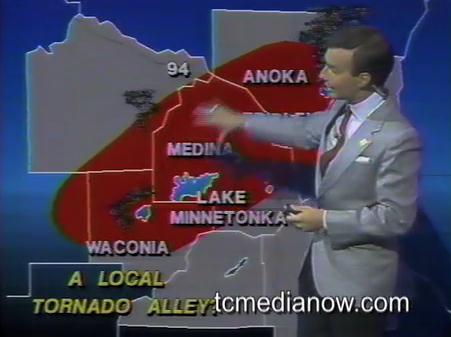
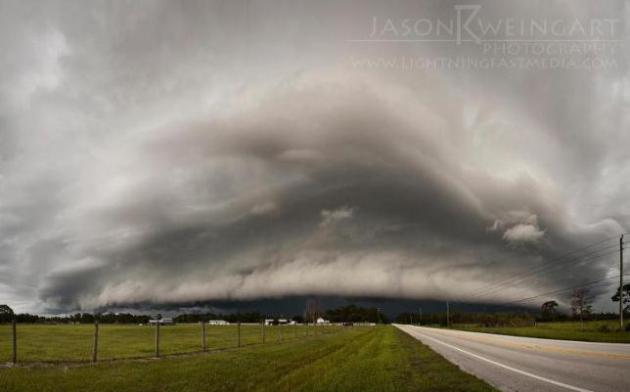


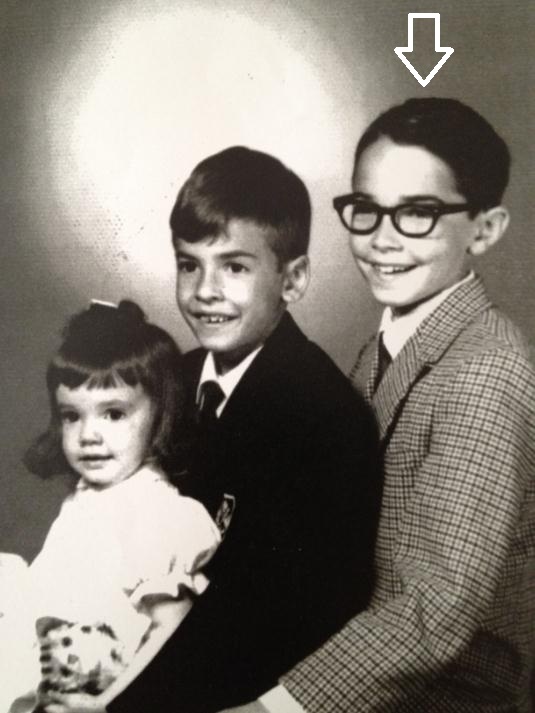
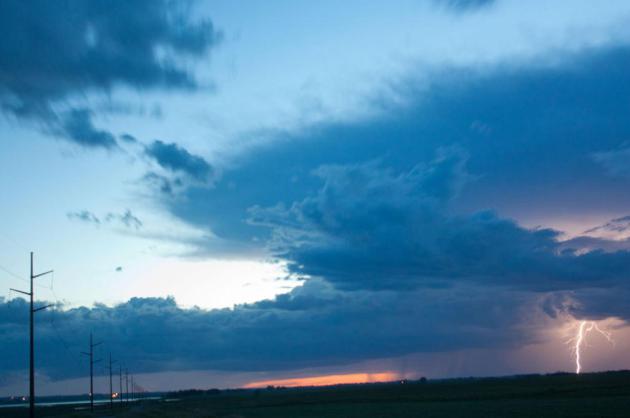
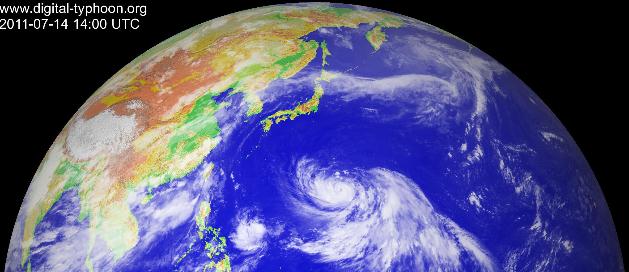




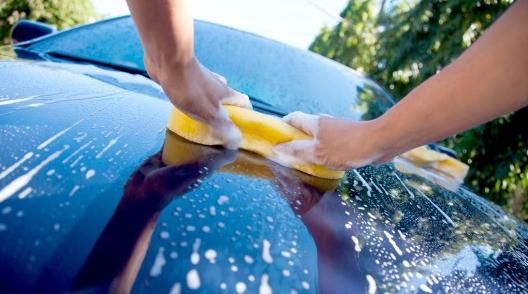
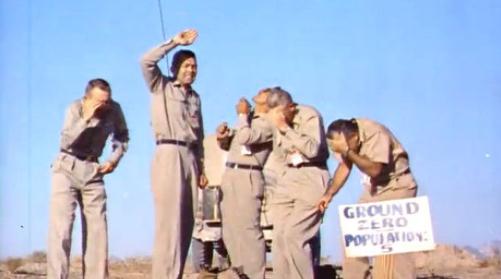



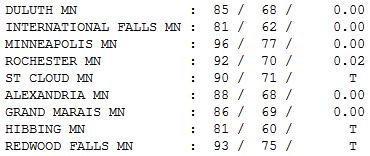
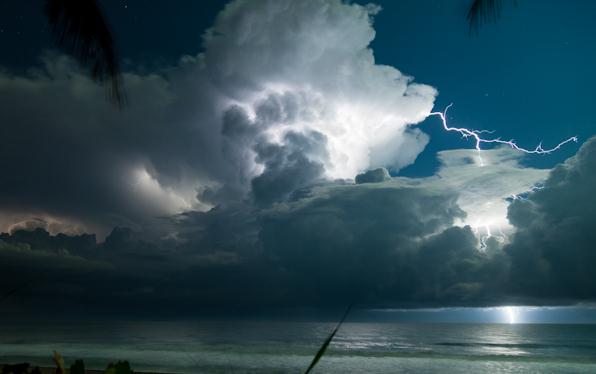
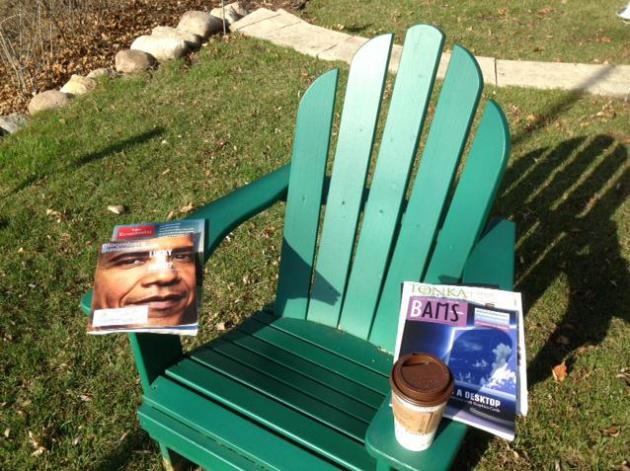
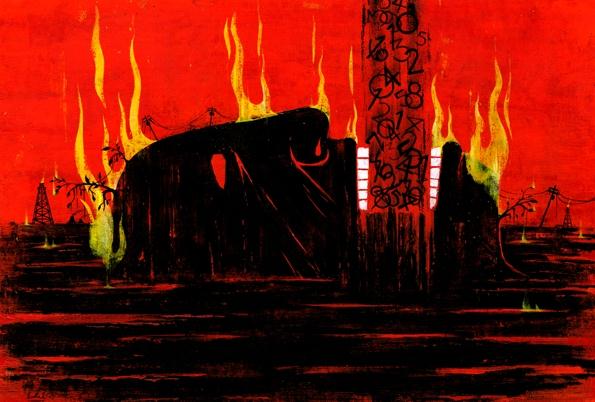
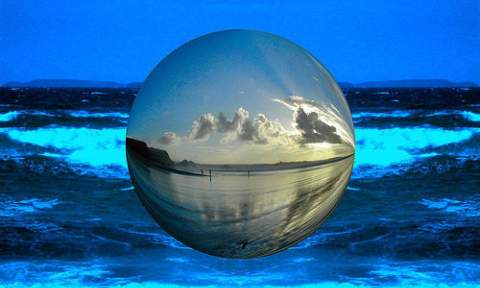

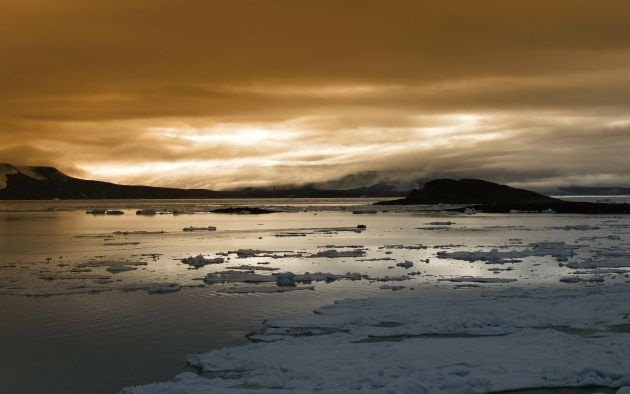

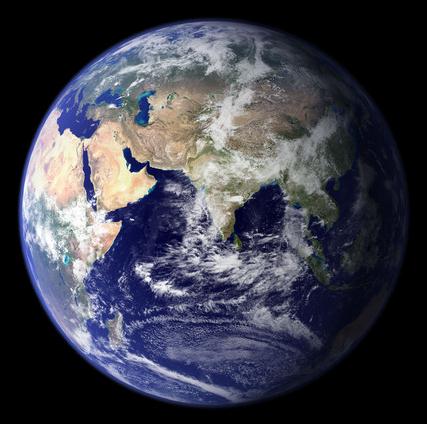
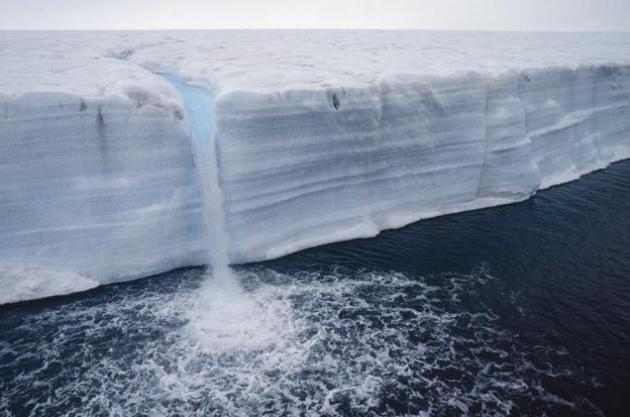

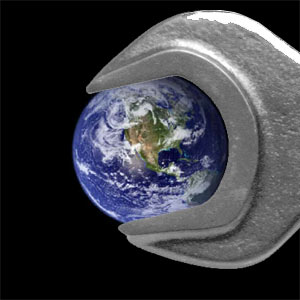
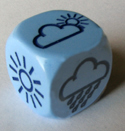
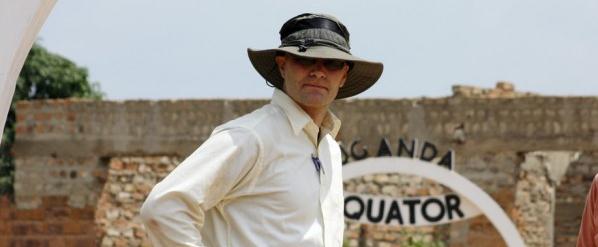
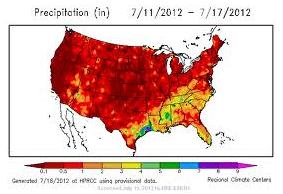
No comments:
Post a Comment